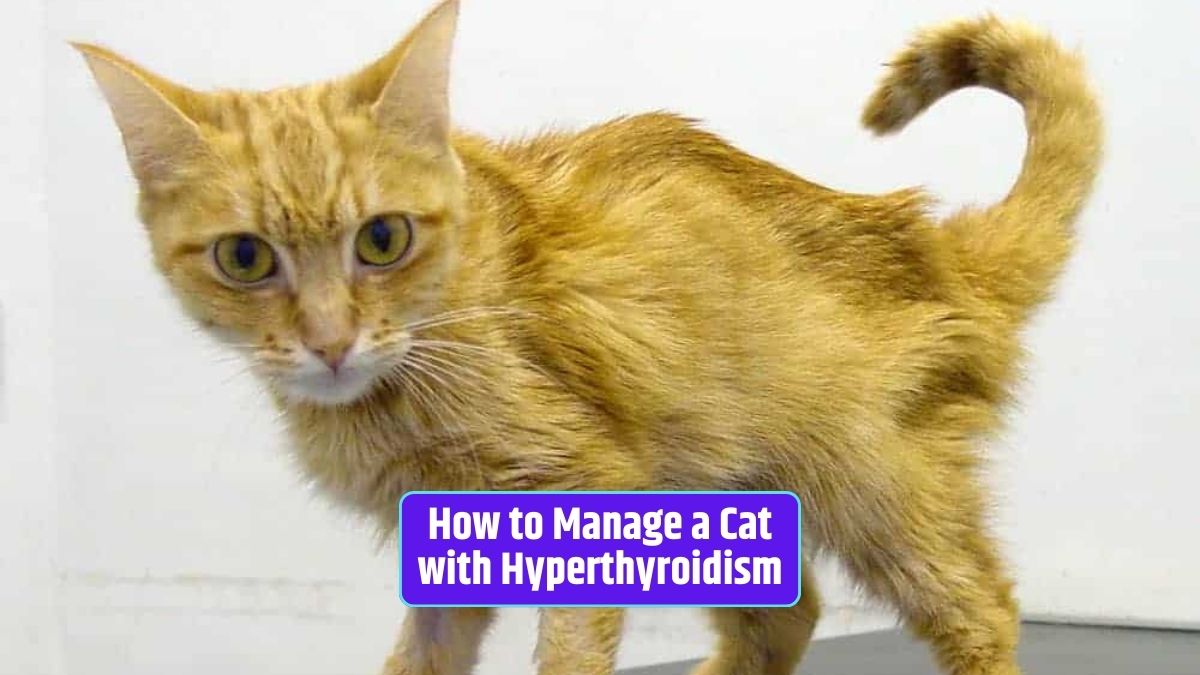Hyperthyroidism is a common condition in cats, especially in older felines. It’s a thyroid disorder that results from an overproduction of thyroid hormones, leading to various health issues. If your beloved cat has been diagnosed with hyperthyroidism, don’t worry; it’s manageable.
In this article, we’ll explore what hyperthyroidism is, the signs to look for, how it’s diagnosed, and most importantly, how to manage and improve the quality of life for your furry friend.
Hyperthyroidism
Hyperthyroidism occurs when the thyroid gland, a small butterfly-shaped organ in your cat’s neck, produces an excessive amount of thyroid hormones. These hormones are responsible for regulating metabolism, and when they’re overproduced, it can lead to a range of symptoms and complications.
Signs
Identifying the signs of hyperthyroidism is the first step in managing the condition. Common symptoms include:
- Weight Loss: Cats with hyperthyroidism often lose weight despite an increased appetite.
- Increased Thirst and Urination: They may drink more water and urinate more frequently.
- Hyperactivity: Cats become more active, restless, and might exhibit behavior changes.
- Vomiting and Diarrhea: Gastrointestinal disturbances can occur.
- Fur Changes: Some cats experience fur matting or a greasy appearance.
Diagnosing
To confirm hyperthyroidism, your veterinarian will conduct various tests, including bloodwork to measure thyroid hormone levels. An ultrasound of the thyroid gland may also be performed. Once diagnosed, treatment options can be discussed.
Treatment Options
There are several ways to manage hyperthyroidism in cats:
- Medication: Anti-thyroid drugs like methimazole can be prescribed. These drugs help regulate hormone levels. Regular monitoring is essential to adjust the dosage as needed.
- Radioactive Iodine Therapy: This is a more permanent solution. It involves a single injection of radioactive iodine that selectively destroys overactive thyroid tissue. Your cat may need to stay at a specialized facility for a few days due to radioactivity, but this treatment is highly effective.
- Dietary Management: Special diets designed to manage hyperthyroidism can be recommended by your veterinarian. These diets are low in iodine, which can help control hormone production.
- Surgery: Thyroidectomy is a surgical procedure to remove the thyroid gland. While it’s an option, it’s less common today due to the effectiveness of other treatments.
Managing
Managing a cat with hyperthyroidism involves more than just treatment. Here are some tips to ensure your cat’s well-being:
- Regular Vet Visits: Ensure your cat’s thyroid hormone levels are monitored through regular vet check-ups.
- Medication Adherence: If your cat is on medication, follow the prescribed schedule diligently.
- Stress Reduction: Minimize stressors in your cat’s environment, which can exacerbate symptoms.
- Dietary Considerations: If your cat is on a special diet, adhere to it as instructed.
- Affection and Comfort: Provide your cat with the love and attention they need to feel secure.
Conclusion
Hyperthyroidism is a manageable condition in cats. By recognizing the signs, seeking a proper diagnosis, and discussing treatment options with your veterinarian, you can help your cat lead a healthier and more comfortable life.
Regular monitoring and attentive care are the keys to successfully managing hyperthyroidism in your feline companion.
FAQs
Is hyperthyroidism common in older cats?
Yes, hyperthyroidism is more common in cats over the age of 10.
Can hyperthyroidism be cured?
While it’s not always curable, it can be effectively managed with proper treatment.
What are the potential side effects of medication for hyperthyroidism?
Side effects of anti-thyroid medication may include vomiting, loss of appetite, and skin rashes.
Is radioactive iodine therapy safe for cats?
Yes, it is generally considered safe and highly effective, with minimal side effects.
Can I provide home remedies for my cat’s hyperthyroidism?
It’s best to consult your veterinarian for professional treatment and not rely solely on home remedies.









